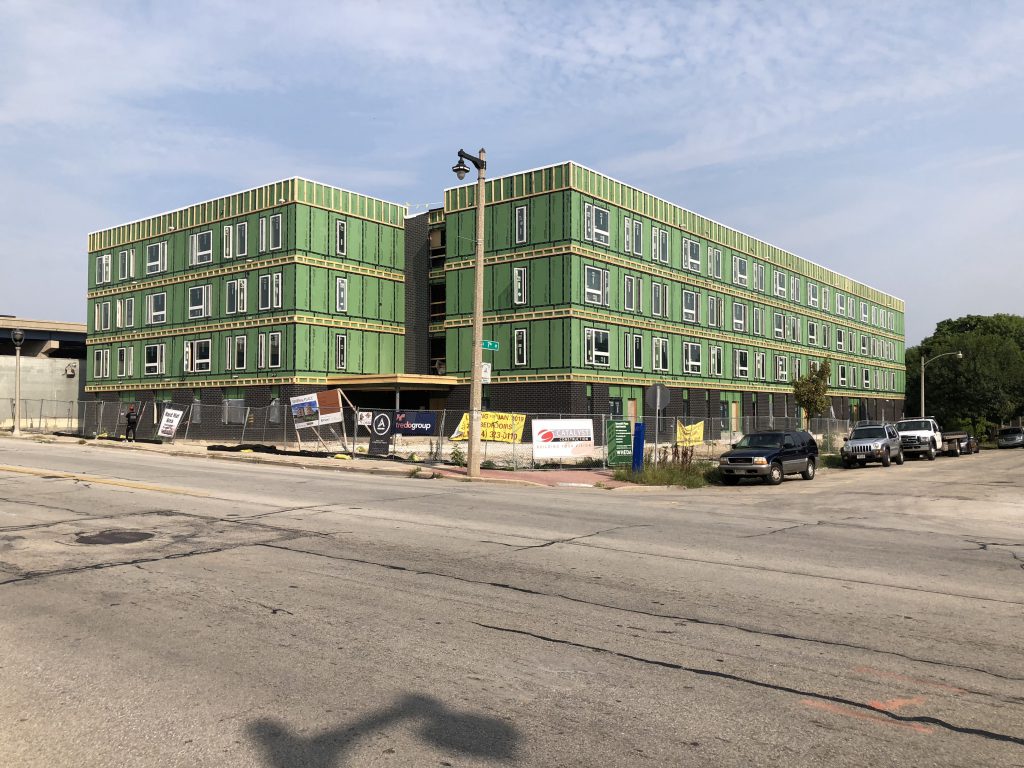Any City Progress on Affordable Housing?
Has Barrett's 10,000 homes initiative had an impact? Council members give mixed grades
Mayor Tom Barrett’s 2018 pronouncement of a 10-year plan to create or maintain 10,000 affordable homes was met with approval from the Common Council.
But one year later, the results have been mixed, say council members.
“There’s really no follow-up at all. It’s essentially business as usual,” said Alderman Robert Bauman in an interview.
“A lot of the money we are taking from existing programs and relabeling it,” said mayoral candidate Ald. Tony Zielinski.
Barrett unveiled the initiative in his 2018 State of the City speech, and is expected to provide an update in tomorrow’s 2019 speech, according to a Department of City Development spokesperson. DCD declined to provide specific numbers on progress.
The focus on affordable housing came in the wake of a greater downtown surge in market-rate apartment construction and a scathing look at the nation’s eviction crisis in Matthew Desmond’s book Evicted which takes place in Milwaukee.
Council members would like to see more done. That includes expanding the leasing or sale of the approximately 1,000 city-owned homes acquired through tax foreclosure, adding staffing and resources to the Housing Trust Fund, finding ways to develop affordable housing in higher income areas and simply better marketing of the programs.
In recent years the city has started using tax-incremental financing to support financing gaps in affordable housing developments including the SEVEN04 Place and Legacy Lofts apartment complexes. The change in TIF policy came in response to the declining value of the federal low-income housing tax credits and increased construction costs. Barrett said he anticipated more developments like these in his 2018 speech.
That speech also announced that one city effort, the STRONG Home Loans Program, which issues forgivable loans for home repair would be expanded. “Associated Bank has agreed to purchase a significant portion of our STRONG Homes Loan portfolio, which means we hope to add approximately $1.5 million to the funds available to help people stay in their homes,” Barrett said. The bank agreed to a $200 million settlement with the federal government in 2015 for discriminatory lending practices.
Ald. Cavalier Johnson said the city could improve the marketing of such programs. “I think we have to improve on getting the word out to people that take advantage of our programs,” he said. The northwest side alderman sits on the board of the Redevelopment Authority of the City of Milwaukee.
Johnson represents the residents of the city’s Westlawn housing development and praised the Choice Neighborhood Initiative for guiding the redevelopment of the large, affordable housing complex.
The reality is that Barrett and the council can’t handle the issue in isolation. Bauman and Ald. Nik Kovac both acknowledged the need for changes in state law to support and improve the city’s housing programs.
Bauman singled out potential changes to state tax incremental financing law that could allow the city to harvest increased property tax revenue from new luxury developments, like the Mandel Group’s Portfolio tower, to create revenue streams to support citywide affordable housing programs.
New housing is only part of Milwaukee’s housing issue. Kovac praised the efforts of the administration and assistant city attorney Kail Decker in fighting slumlords: “The mayor’s focus on this does reflect that we doing a few things better than we used to.”
The focus on enforcement came after a Milwaukee Journal Sentinel series exposed a number of property owners taking advantage of complex legal structures to evade enforcement and hide the extent of their holdings.
Kovac, who represents the city’s East Side, wants to see more affordable housing in his district and other wealthy areas of the city. “I am proud that we got any and I wish we had more,” said Kovac. The Greenwich Park Apartments opened in his district in 2017, after nearly a decade of complications surrounding its financing and a now-revised state formula that de-incentivized affordable housing in wealthy census tracts.
Zielinski, a frequent critic of DCD commissioner Rocky Marcoux, says the city could use new staff focused on the effort. “One of the key things, when you’re initiating new programs, is you have to have capable people in key positions,” he noted. Bauman praised multiple DCD staffers, but said there simply aren’t enough of them to make progress. “You want to increase output, you increase the capacity,” said the alderman.
None of the council members interviewed indicated they knew how many units or what programs Barrett would tout in his speech. “I’m curious what the announcement will be on Monday,” said Johnson.
Council president Ashanti Hamilton, zoning committee chair Khalif Rainey and council members Jose G. Perez and Milele A. Coggs did not respond to a request for comment.
Political Contributions Tracker
Displaying political contributions between people mentioned in this story. Learn more.
- December 23, 2020 - Tom Barrett received $500 from Rocky Marcoux
- October 30, 2019 - José G. Pérez received $200 from Tony Zielinski
- December 22, 2018 - Tom Barrett received $500 from Rocky Marcoux
- December 29, 2017 - Tom Barrett received $500 from Rocky Marcoux
- March 1, 2017 - Tom Barrett received $400 from Rocky Marcoux
- February 20, 2016 - Cavalier Johnson received $250 from Robert Bauman
- May 7, 2015 - Nik Kovac received $10 from Cavalier Johnson
- May 5, 2015 - José G. Pérez received $10 from Cavalier Johnson























